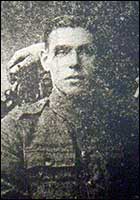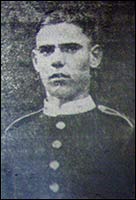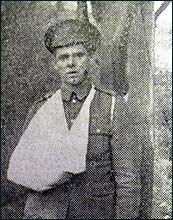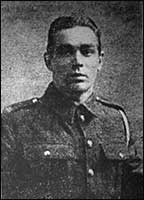 Son of Mr Harry & Mrs Pollie Parker Son of Mr Harry & Mrs Pollie Parker
Aged 22 years
Died 23rd September 1918
Commemorated at Bac-du-Sud British Cemetery, Bailleulval
Grave VI. A.24
|
| Born and resided at Rushden, enlisted at Bedford. |
The Rushden Echo Friday 20 November 1914, transcribed by Nicky Bates
Rushden Man in the Bedfordshire Regiment - No News of Him
Mrs H Parker of Rushden, whose son Pte H Parker, of the Bedfordshire Regiment has been at the front for six weeks, has not received any news of him since he left England.
If this should meet the eye of any of his regimental comrades at the front, Mrs Parker, would very grateful if they could send her news of him. Her address is 8, Dell-place, Rushden.
|
The Rushden Echo Friday 27 November 1914, transcribed by Nicky Bates
Seven Weeks Without News - Rushden Soldier's Silence
No news of Private H Parker, of the Bedfordshires, son of Mrs Parker, of Dell-place, Rushden, has reached his mother for seven weeks and naturally she is in a state of great anxiety about him. To makes matters worse, she herself is ill. She communicated with the War Office, and has received a reply to the effect that, so far as is known, he is still serving with his corps with the Expeditionary Force.
|
 |
|
Private Harry Parker
|
The Rushden Echo, 4th December, 1914, transcribed by Jim Hollis
Rushden Soldier Wounded - A Finger Shot Off - “The Worst Part of The War”
“The Kaiser’s blown our Harry’s finger off!” said Pte. H. Parker’s little sister, when opening the door to a representative of the “Rushden Echo” yesterday. In our last issue we reported that no news of Private Parker, whose photo we publish herewith, had been received for seven weeks, and that his mother (Mrs. Parker, of Dell Place, Rushden) who is ill, was in a state of great anxiety concerning him. Yesterday morning Private Parker’s long silence was explained when a letter was received from him to the effect that he has been wounded, having lost a finger of the right hand, and being therefore unable to write. In his letter he says :-
“Just a few lines, hoping to find you all quite well. I am in England wounded. I have got a finger shot off, on the right hand, so I cannot write very well. I am glad to be back. I have been through the worst part of the war. I shall soon be home to see you. You must save me a bit of plum pudding! Write back and tell me if all is well.”
|
Evening Telegraph, Wednesday, 9th December 1914, transcribed by John Collins.
The Best of Everything
Pte. Harry Parker, of Dell-place, Rushden, belonging to the 3rd Beds Regiment, has been wounded in the hand and is now in hospital in London. He writes that he is sorry to hear that George Wrighton, of Cromwell-road, was shot in the back three or four weeks ago. He could not say if Wrighton was dead or alive. Proceeding, he says they need not send him anything as he gets everything of the best. He does not think he will be better for Xmas.
|
The Rushden Echo Friday 25 December 1914, transcribed by Nicky Bates
A Rushden 'Bedfordshire' Now Convalescent - News Wanted of Pte Wrighton
Pte Harry Parker, 3rd Beds. Regt, whom we reported wounded in a recent issue, is now in Parkgate Convalescent Home, Neston, Cheshire. Writing home to his mother he says:-
"I am very sorry to hear you are ill. George Wrighton (Pte G Wrighton, of Cromwell-road), is wounded. He was hit in the back about four weeks ago but I could not tell you if he is alive or dead."
Proceeding he says he does not know whether he will get home for Christmas. He writes further: "I shall get my discharge from the army. You need not send anything for I get everything of the best. I don't think I shall be better by Christmas."
In regard to Pte Wrighton, we are informed that his parents communicated with the War Office, about three weeks ago asking for news of their son. A reply was received to the effect that so far as was then known he was still serving with the Expeditionary Force, the latest information on which the reply was based being dated Nov. 14.
Mr and Mrs Wrighton, 53, Cromwell-road, Rushden, Northants, would be pleased to receive any further news concerning their son, should this meet the eye of any of his comrades at the front or at home.
A letter received this week from Private Parker (Rushden), who has been wounded, was as follows:- "Although my finger is getting on all right I cannot get home for Christmas. It will be three or four weeks before it is right again. I was wounded in the bombardment of a town called Salley. I was up at Ypres for four weeks in the trenches. We had a very hot time of it. They shelled us all day and all night. We had to get away from there to get some more men, as we were losing nearly all ours."
|
The Rushden Echo Friday 8 January 1915, transcribed by Nicky Bates
Seven Times Wounded Rushden Soldier's Experience - 'All Right Now'
We recently reported that Private Harry Parker (of Dell-place, Rushden) had been wounded. He now writes to his mother from the Convalescent Home, Woolton, near Liverpool. "Did you get that letter to say I was coming home? Well, I started, and instead of going home, as I thought they sent me here. I did not tell you at first because I thought but might upset you. Now I will tell you. I have been wounded seven times - twice in the fingers, once in the head, and twice in each leg."
|
The Rushden Echo Friday 26 February 1915, transcribed by Nicky Bates
Seven Times Wounded - Rushden Soldier's Experience - Pte Harry Parker at Home - More about the White Flag Business - Howitzers Like Tree trunks Flying Through the Air - An Amusing Incident
In the service of his King and country, Private Harry Parker (Rushden), of the 3rd Bedfords, who has been wounded seven times, has had some very unpleasant experiences of war. Although he has met with some rough usage at the hands of the enemy, we are gratified to learn that he has done more than his share in maintaining the honour of Britain.
Asked by a "Rushden Echo" representative if he had settled any Germans, Pte parker, now at home wounded, said he had killed quite a number.
"I broke a bayonet in one, just as I had struck him," he continued. "At Ypres I was in two bayonet charges and at La Bassee in another one. At the latter place we were shelled out of the trenches and although we made tiiree charges to re-take them, we were not successful. Of course, such charges can be made only at night, and you might be within a few feet of a German. It is bayonet for bayonet then and if you don't get your man he will have you!"
"As early as the retirement from Mons, I got two slight wounds hi the legs and more recently I was wounded in the hand at La Bassee in one battle about midnight. In addition to that I got frostbitten feet and had to be taken from the trench on a stretcher."
Have you helped capture any prisoners?" we asked.
"No, "replied Pte Parker. "We can never safely venture into the open to take German prisoners. If they show a white flag it means treachery more often than not. They once had three or four regiments concealed in a wood and a few of them appeared with a white flag. Knowing their strength, our own soldiers made no attempt to capture them but answered the white flag with shells. Our artillery eventually shelled them out of the wood! I saw from a distance the 'white flag business' played on the Northamptons. We were on their right and saw then cut up, but were too fully occupied ourselves to go to their assistance. I have seen a good many of my pals injured, but only one was a Rushden man - Pte Wrighton, of Cromwell road. He was in a trench when a shrapnel shell burst overhead. He tried to dodge it but was struck in the back of the shoulder. Of what happened to him afterwards I have no idea.
"We cannot tell how the general thing is going on as we are limited to own range of vision. Newspapers sometimes reach us. Lloyds News came - six weeks old - and reported in long columns the 'grand charge of the London Scottish!' Never have I known such cursing as there was over that bogus affair. The London Scottish got credit for a charge that was made by an entirely different regiment!"
"Conditions now are somewhat better for the British, are they not?" our representative inquired.
"A great deal better," Pte Parker replied. "At first we have had to stay hi the trenches as long as 21 days at a time. But now only three days and three nights are necessary. That is quite bad enough when you are up to your knees in mud and water. And that was the rule rather than the exception. There was no escaping it - dig your trench and 'stick; there! If a 'Jack Johnson' came over that would dig it for you! It is like an iron-foundry coming along! The French howitzers seem quite as powerful. They are like tree trunks flying through the air.
"We had a little bit of liberty sometimes. I remember a rather laughable incident of chasing and picking a chicken. I saw the rooster and made for it with an eye to business. It looked quite a decent specimen of the feathered tribe but when I captured it it proved to be nearly all fluff and feathers. However, I was not going to set it free after my trouble in catching if so killed and picked it. Together with some potatoes and turnips I put the 'joint' hi an old rusty pot over a fire and smacked my lips. Things were going very nicely when an order came from the officer. 'Charge men,' he roared. I kicked the whole box of tricks as far as I could, in my rage, and off we went with fixed bayonets!
"It is nothing unusual to see soldiers, in their spare moments, charging with bayonets he pigs in a farmyard. Once he is got to hay, the porker is stuck and a piece is sliced from it and cooked, the remainder left. The peasants who are plucky enough to keep to then" homes within the war zone sometimes walk round after such scraps.
"The 'rests' that we get from trench fighting are not always what you night think. There is no such thing as a feather bed and a spring mattress. Old barns are our cover and once I was allotted a pig-stye with straw to lie on!"
"Have you seen any exciting work by aviators?"
"Yes, I saw an English airman chase a German and fetch him down, and I have seen one of our own brought to the ground. The pilot and his passenger were dropping smoke bombs and revealing the enemy's position. The Germans fired on it and aeroplane made a dive towards earth. Just before it touched one of the men fell out and the machine was soon one mass of flames."
Pte Parker, who is only 19 years of age, joined the army in April 1913. He has only been to training camp once before the war. Since he has been to the front he has been hi the 'battle of three rivers' (?at Seine), and has seen much service at Ypres, La Bassee, and other places. He has had his rifle smashed with bullets, his equipment shattered, and his uniform torn to rags on barbed wire. He is not optimistic of an early conclusion of the war. He left the firing line in November last and was in England three days, as he says, the French hospitals are full of British wounded and every man who can possibly be brought straight home is dispatched without waste of time. He was taken to a hospital in Liverpool and after a long stay got home on Friday.
|
The Rushden Echo Friday 20 August 1915, transcribed by Nicky Bates
Eight Times Wounded Yet Volunteers for the Front - News of Rushden Soldier Wanted by His Friends
Pte Harry Parker, of 8 Dell-place, Rushden, who, as reported some time ago in the "Rushden Echo", has received eight wounds, wrote home ten weeks ago to-day to say that he had again volunteered for the front. His mother has written a number of letters to him since, but has had no reply, and naturally her anxiety is very great. She will be very glad to have any information as to his whereabouts. His last known address was: -
Pte Harry Parker,
7303, No 4 Company,
3rd Bedfordshire Regt, Landguard,
Felixstowe.
Though he will not be 19 years of age until September 27th next, he has seen much service during the present war. He stands 6 feet 4½ inches high.
Information may be sent to the Editor, "Rushden Echo", 5, Park-road, Rushden, or to Mrs Parker, 8 Dell-place, Rushden, Northamptonshire.
|
The Rushden Echo Friday 21 December 1917, transcribed by Nicky Bates
Twelve Wounds - Now Frostbitten Rushden Soldier in Hospital
Pte Harry Parker, 7303, - Beds Regiment, son of Mrs and Mrs Parker of 8, Dell place, Rushden who has twice been wounded (sustaining twelve wounds in all) is again hi hospital. He writes: -
"Dear Dad and all, - Just these few lines to let you know I have landed in England, and am in hospital at Ipswich. My feet have been frozen, so I am helpless for a time, but I am getting on nicely. It seems a treat to be away from the 'hell' out there. I went in the trenches when I got back, and had five days up to my waist in water; then it froze hard, and about a dozen of use were nearly frozen in mud. I cannot move my feet yet."
Pte Parker, who stands 6 feet 4½ inches high, and is 21 years of age, wears four stripes - one for long service (five years), one for good conduct, and two for having been twice wounded. He was recently home on leave and went back four weeks ago last Saturday.
|
| The Rushden Echo, 27th September, 1918, transcribed by Jim Hollis
Sergt. Harry Parker, of the Bedfordshire Regiment, son of Mr. & Mrs. H. Parker, of Dell Place, Rushden, has, we regret to say, been killed in action. He was shot in the back on September 23rd, and the missile went right through the body, causing fatal injuries. The late Sergt. Parker, who was 22 years of age, formerly worked at Messrs. Harris’s currying works. He was an old soldier, having served in the Bedfordshire Regiment, and was time expired. The very day after the declaration of war he rejoined, and had been practically the whole time in France, with the exception of a few months which he spent in training at Felixstowe.
He had been wounded many times. Several of his fingers were blown off in the earlier days of the war, and on another occasion he received injuries which necessitated the insertion of a silver plate at the top of his head. In all he had received 30 or 40 wounds, some of them of a very serious character. Deceased was not married. News of the death of Sergt. Parker was received in a letter from the chaplain at a Casualty Clearing Station as follows:-
“Sept. 24th, 1918. – Dear Mrs. Parker, - I expect you will have heard by when this reaches you the sad news of the death of your son in the C.C.S. He came in seriously wounded in the chest, and we hoped that after the operation he would get better, but he did not make any real recovery, and died quietly and I think without much pain, about 7.30 on Sunday evening. His body was buried in the cemetery here, not very far from Arras, yesterday afternoon, and a cross with his name on will be put at the head of the grave. With all my sympathy in your sorrow, I am, Yours sincerely, Wilfred Hambridge.”
Mr. & Mrs. Parker have another son serving with the Colours, namely, Driver Albert Parker, R.G.A., who is 24 years of age, and who, before joining the Forces, worked for Messrs. Eaton & Co., boot manufacturers, of Rushden.
|
Rushden Echo, October 4th, 1918, transcribed by Greville Watson
Rushden’s Casualty List - Victims of the War
Sergt. Harry Parker, of the Bedfordshire Regiment, son of Mr and Mrs H. Parker, of Dell-place, Rushden, has, we regret to say, been killed in action. He was shot in the back on September 23rd, and the missile went right through the body, causing fatal injuries. The late Sergt. Parker, who was 22 years of age, formerly worked at Messrs Harris’s currying works. He was an old soldier, having served in the Bedfordshire Regiment, and was time expired. The very day after the declaration of war he rejoined, and had been practically the whole time in France, with the exception of a few months which he spent in training at Felixstowe. He had been wounded many times. Several of his fingers were blown off in the earlier days of the war, and on another occasion he received injuries which necessitated the insertion of a silver plate at the top of his head. In all he had received 30 or 40 wounds, some of them of a very serious character. Deceased was not married. News of the death of Sergt. Parker was recieved in a letter from the chaplain at a Casualty Clearing Station as follows : “Sept. 24th, 1918.–Dear Mrs Parker.–I expect you will have heard by when this reaches you the sad news of the death of your son in the C.C.S. He came in seriously wounded in the chest, and we hoped that after the operation he would get better, but he did not make any real recovery, and died quietly and I think without much pain about 7.30 on Sunday evening. His body was buried in the cemetery here, not very far from Arras, yesterday afternoon, and a cross with his name on will be put at the head of the grave. With all my sympathy in your sorrow, I am, yours sincerely, Wilfred Hambridge.” Mr and Mrs H. Parker have another son serving with the Colours, namely, Driver Albert Parker, R.G.A., who is 24 years of age, and who, before joining the Forces, worked for Messrs Eaton and Co., boot manufacturers, of Rushden
|
 Kettering Leader, 4th October 1918, transcribed by John Collins. Kettering Leader, 4th October 1918, transcribed by John Collins.
A Mons Hero - Rushden Sergeant Dies of Wounds
Mr. and Mrs. Parker, of 8, Dell-place, Rushden, and Miss Beeby, of Wellingborough, late of Raunds, his fiancée, have received the sad news from the matron of the 46th Casualty Clearing Station I France that Sergt. Harry Parker (22), Bedford Regiment, died on September 22nd from gunshot wounds received in action on the 5th September. He had seen much of the fighting since 1914, he being in the retreat from Mons. This was the third time that he was wounded. He was in the Regulars at the outbreak of the war, and was one of the first to go to France. He was at home for the last time at the end of February.
|
Rushden Echo, 4th October 1918, transcribed by Kay Collins
Casulaty List
Sergt. Harry Parker, of the Bedfordshire Regiment, son of Mr. and Mrs. H. Parker, of Dell-place, Rushden, has, we regret to say, been killed in action. He was shot in the back on September 23rd, and the missile went right through his body, causing fatal injuries. The late Sergt. Parker, who was 22 years of age, formerly worked at Messrs. Harris’s currying works. He was an old soldier, having served in the Bedfordshire, and was time expired. The very day after the declaration of war he rejoined, and had been practically the whole time in France, with the exception of a few months which he spent in training at Felixstowe. He had been wounded many times. Several of his fingers were blown off in the earlier days of the war, and on another occasion he received injuries which necessitated the insertion of a silver plate at the top of his head. In all he had received 30 or 40 wounds, some of them very serious character. Deceased was not married.
 |
|
Driver A Parker, R.G.A.
|
News of the death of Sergt. Parker was received in a letter from the chaplain at a Casualty Clearing Station as follows: “Sept. 24th, 1918—Dear Mrs. Parker, I expect you will have heard by when this reaches you the sad news of the death of your son in the C.C.S. He came in seriously wounded in the chest, and we hoped that after the operation he would get better, but he did not make any real recovery, and died quietly and I think without much pain, about 7.30 on Sunday evening. His body was buried in the cemetery her, not very far from Arras, yesterday afternoon, and a cross with his name on will be put at the head of the grave. With all my sympathy in your sorrow, I am, yours sincerely, Wilfred Hambridge.”
Mr. and Mrs. Parker have another son serving with the Colours, namesly, Driver Albert Parker, R.G.A., who is 24 years of age, and who, before joining the Forces, worked for Messrs. Eaton and Co., boot manufacturers, of Rushden.
|
|